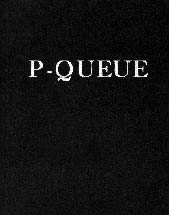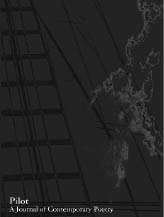Literarily Speaking
by Peter Koch


And now I bid my hideous progeny go forth and prosper. So said Mary Wollstonecraft Shelley in 1816, writing the introduction to her now-classic novel Frankenstein. The sentiment Shelley was expressing then is common to all art, but perhaps (just perhaps) rings most familiar for writers and editors. You work for days or weeks or months, tweaking text, rearranging sentences and stanzas, trying your best to cut the verbal fat from your work or your publication until you think it’s prepared to go out and survive in the world. It is your child on his first day of school, and it’s time to gather up your courage, let go of his hand and cross your fingers that he doesn’t get hit by the bus.
Editors Sarah Campbell and Matt Chambers, both of whom run literary magazines out of UB’s Poetics program—P-Queue and Pilot—understand that feeling, and they spoke briefly with AV on the eve of the launch party for their latest editions.
P-Queue
Sarah Campbell, a grad student in UB’s Poetics program, hopes to finish her PhD this Spring. P-Queue, now in its third year, is her first solo venture into publishing. She says that the work in the journal plays not only at the line between poetry and prose, but also the lines between other ideas of genre.
AV: Tell us about P-Queue.
SC: P-Queue is the journal I started, and my editorial focus for it is to look at the borders between poetry and prose, and feature works that toggle between being one or the other, which can be variously defined by the writers themselves. So essays that work like poems, poems that work more like prose pieces and all sorts of things between. I publish an average of ten contributors per issue, and usually half or a third are from Buffalo. Most often they are graduate students in the English program, and often in the Poetics program. This year we also have a music department professor, the media director at Hallwalls. Alongside them are national writers from various places.
AV: Is it a financially self-sustaining publication?
SC: The bulk of the funding comes from the Graduate Student Association’s Scholarly Publications Fund, and then grants from various chairs at the university. The policy has always been to give one free to any UB grad student who wanted it and will read it. So most copies are, honestly, given away. But it is for sale to anyone who isn’t a UB grad student. The print run is very small, so it’s very much the epitome of grassroots: a small local thing that tries to go out into the world and circulate. Not to make a profit, but to get people reading what we’re doing here.”
AV: This is your first venture into publishing?
SC: First I’ve been in charge of. I worked in publishing in Seattle in the mid- to late-90s, just as an editorial assistant. So I got a lot of my experience there, from the bottom up as a glorified secretary.
AV: What happens to P-Queue once you move on?
SC: “I’m handing it off this year to an incoming student in the program, which is somewhat unique in the tradition of these journals because often they just live the lifespan of the grad student who works on them.”
Pilot
Matt Chambers is a long-time, on-and-off Buffalo resident. He got his undergrad degree at UB before moving away for a time. Now he’s returned, and he’s seeking a PhD in UB’s English Department. He co-edits Pilot with Andrea Strudensky.
AV: Tell us about Pilot.
MC: I actually inherited the magazine from Kyle Schlesinger who edited Kiosk for a few years, so it comes out of the graduate English department and it’s a free magazine. In terms of an agenda, we didn’t have much of one. Honestly, we’re kind of feeling our way through this, so we selected people who appealed to us personally. It seemed to cohere into something that does have a shape to it that I like, so that’s basically it. Honestly, it was kind of a learn as we go for the first issue.
AV: Kyle took Kiosk with him when he left, right?
MC: Essentially, I inherited all of that. I didn’t want to keep doing Kiosk, because I don’t have Kyle’s eye for bookmaking, and also I think he wanted to hang on to the name.
AV: Where’d you come up with the name?
MC: It came from a brainstorming session I had with someone who no longer edits the magazine. He like the idea of Pilot Light, and I thought it would be just a little simpler to call it Pilot. Any title to any magazine’s going to be pretentious, any one-word title. I thought that sounded, sort of on a visceral level, less pretentious than other names that appealed to me. Any other name we were coming up with sort of sounded like something you’d name your cat (laughs). There’s also the sense of a pilot that’s not only like an airline pilot, but also boating or sailing, navigating...it has that appeal. I feel like it’s vague enough that it doesn’t necessarily have to be any of those things.
AV: What kinds of submissions did you get for your first issue?
MC: It was a closed submission. We solicit everyone that is in the magazine. There’s a magazine up in Canada called The Gig that has a similar soliciting pattern, with equal parts British, Canadian and American writers. I think if we had any agenda it was that, to feature any writer we liked who may not be known in the States. That sounds rather grand, I know, but it’s not. It’s very simple. The people in the magazine are not unknown in this little world we inhabit, but at the same time there’s not as much access to their work as one would like.
AV: Is it common for this kind of literary magazine to see the light of day outside of the “little world” you refer to?
MC: I work up at the Poetry Collection. Right now I’m talking to you and I’m standing in front of literally thousands of magazines, and we’ve got catalogues here. They’re in all shapes and sizes, conditions and quality of form and authorship. I like the fact that it’s free. I think there are enough people out there who are dedicated enough to doing this. We just got a submission of a whole collection of an underground magazine that was run by this guy from South Carolina. He did it for years, and he was just publishing everyone. He lived with his parents and had a pizza delivery job into his 40s, but he just kept putting his magazine out, and I think it had a pretty wide readership. It’s tough, but it’s done everyday all over the place.
The co-launch party for these two magazines takes place this Friday, Sept. 1 @ 8pm at Rust Belt Books on Allen Street. Featured performances by contributors Kevin Thurston, James Currie, Michael Basinski, Brian Mornar, Chris Fritton, Zack Finch, Joanna Raczynska and Angela Szczepaniak. “Come for the poetry, stay for the company,” is the mantra for this special event.
|
Issue Navigation> Issue Index > v5n35: Face To Face (8/31/06) > Literarily Speaking This Week's Issue • Artvoice Daily • Artvoice TV • Events Calendar • Classifieds |









 Current Issue
Current Issue